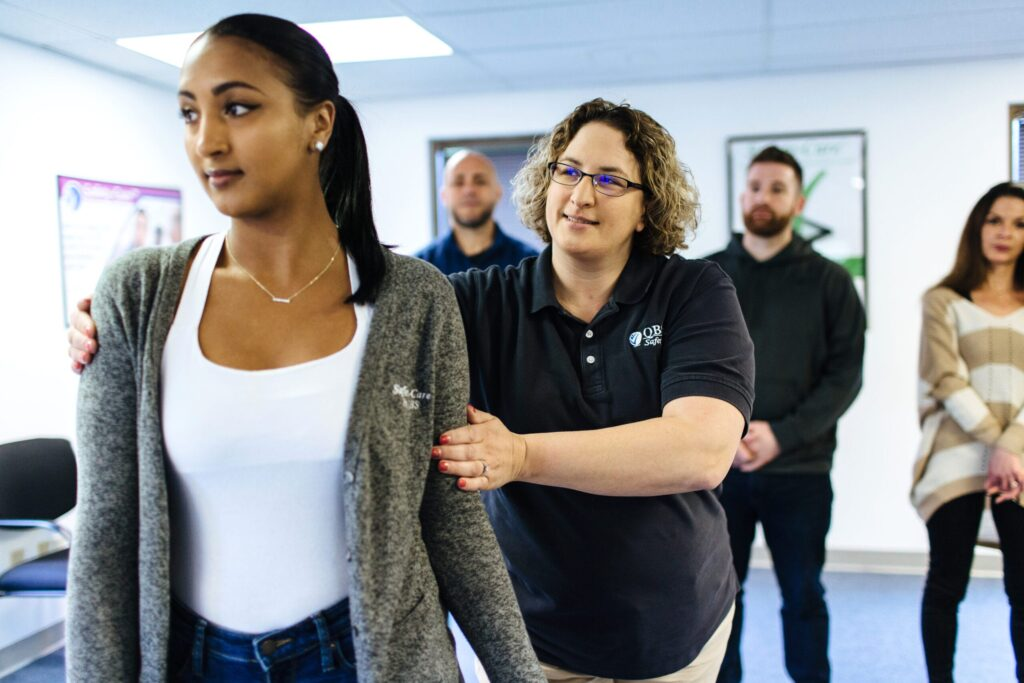Illinois 77 Administrative Code 973 – Alzheimer’s Disease and Related Dementia Services Act
Illinois 77 Administrative Code 973 sets several new requirements for the training of staff regulated under the Assisted Living and Shared Houseing Act, Nursing Home Care Act, Home Health, Home Services, and Home Nursing Agency Licensing Act, and the Hospice Program Licensing Act. The new requirements include documented plans for the treatment of patients with Alzheimer’s or dementia as well as six hours of initial training for all staff with direct access to patients and three hours of advanced training annually.

.png?width=88&height=95&name=Group%20137%20(5).png)


How to Implement Safety-Care?
-
Register for a Safety-Care Trainer class or call us to request a closed session for your organization. We regularly conduct classes in all 50 states and Canada.
-
Complete your class to become a certified Safety-Care Trainer for your organization. We bring you to fluency using an errorless teaching methodology.
-
You train and certify your staff in Safety-Care’s effective techniques.
-
Our Master Trainers are available by phone, email, or video to help your organization with any questions or concerns while using or implementing Safety-Care.

Legal Requirements
|
Summary and Safety-Care Alignment: Effective: June 7, 2019 Last Updated: December, 2024 Illinois 77 Administrative Code 973 sets several new requirements for the training of staff regulated under the Assisted Living and Shared Houseing Act, Nursing Home Care Act, Home Health, Home Services, and Home Nursing Agency Licensing Act, and the Hospice Program Licensing Act. The new requirements include documented plans for the treatment of patients with Alzheimer’s or dementia as well as six hours of initial training for all staff with direct access to patients and three hours of advanced training annually. How Safety-Care aligns: Numerous health organizations throughout the United States and Canada rely upon QBS and our Safety-Care training to provide their staff members with the training they need to help maintain a safe and healthy environment. Safety-Care provides a comprehensive, supportive approach to incident prevention, de-escalation, and management. Your Staff will learn practical strategies for helping students that use evidence-based practices consistent with PBIS (Positive Behavior Interventions and Supports) and ABA (Applied Behavior Analysis). Safety-Care can meet the requirements of Departmental Requirements in the following ways: |
Why Safety-Care?
Benefits & Differentiators
In addition to Safety-Care being highly cost-effective, you get:

Skills to effectively prevent, minimize, & manage behavioral challenges with dignity, safety, & the possibility of change

Decreases in staff and patient injuries and reduction in restraint & seclusion time

Instructional procedures based on decades of evidence-based research & compatible with ABA, PBIS & reinforcement-based environments

Customizable program for your setting, staff & clientele, with a strong focus on preventative via non-intrusive, replacement behaviors

Extremely rigorous standards grounded in errorless teaching methodology

Small, intimate class sizes backed by unlimited support & resources
How Is Safety-Care So Effective?
A Genuine Focus on Implementing & Managing Positive Behavioral Skills
Proactive, environmental management recommendations
Understanding of evocative effects of staff behavior
In-depth analysis of antecedents and proactive antecedent interventions
Evidence-based reinforcement procedures
Required competency in de-escalation skills
Humane, non-invasive touch and QBS Check™ strategies
Evidence-based teaching procedures
Applicable to a wide array of settings, conditions & challenging behavior





